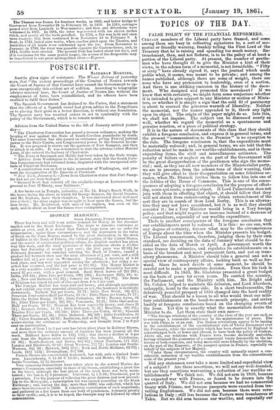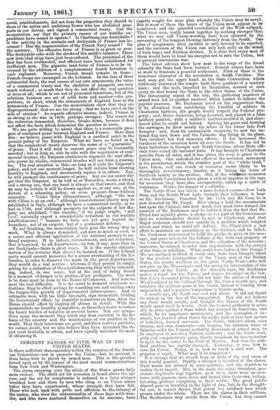TOPICS OF THE DAY.
FALSE POLICY OF THE FINANCIAL REFORMERS. CERTAIN members of the Liberal party have framed, and some among them are busy in collecting signatures to, a sort of me- morial or friendly warning, frankly telling the First Lord of the Treasury that he is raising and spending too much money. Re- trenchment, then, and not Reform, is to be the policy of at least a portion of the Liberal party. At present, the number of gentle- men who have thought fit to give the Minister a hint of their views, in the solemn form of a memorial, is not formidable. " Fifty or sixty" have already signed it, says the journal which made public what, it seems, was meant to be private ; and among the names published, although there are some of weight, there are none who have any pretension to leadership, even of a section. And there is one striking omission in the history of the docu- ment. Who designed and promoted this movement? If we knew that with certainty, we might form some conjecture whether it is intended to give support to any Minister or section of Minis- ters, or whether it is simply a sign that the cold fit of parsimony is about to succeed the generous warmth of liberality. Neither the memorial, nor the names appended to it, throw any light upon its object. The origin of the paper might do so. Into this, we shall not inquire. The subject can be discussed nearly as well, whether we regard the memorial as a spontaneous and genuine reaction, or a piece of political strategy.
It is in the nature of documents of this class that they should exhibit a foregone conclusion, and express it in general terms, and the present "communication to the Premier" is no exception to the rule. The foregone conclusion is, that the expenditure must be materially reduced ; and, in general terms, we are told that the reduction must be made in our warlike establishments, and in those expanding items, the civil and miscellaneous estimates. The penalty of failure or neglect on the part of the Government will be the great disapprobation of the gentlemen who sign the memo- rial; and, as they are all now members of the Ministerialist party, we are to presume, from the solemn tone of their warning, that they will give effect to their disapprobation on some felicitous oc- casion, when Mr. Disraeli invites them to follow him into one of the lobbies of the House of Commons. This is one of the conse- quences of adopting a foregone conclusion for the purpose of effect- ing, coute qui cout,e, a special object. If Lord Palmerston does not join with them in effecting that object, it should follow that they will not shrink from endeavouring to obtain retrenchment of the sort they are in search of from Lord Derby. This is an alterna- tive they may not have considered, but it is as well they should consider it ; for a Tory Minister would bring in a Tory foreign policy, and that might require an increase instead of a decrease of our expenditure, especially of our warlike expenditure.
There is another consequence of the foregone conclusion that our establishments must be reduced. It is this : no one can, with any degree of certainty, foresee what may be the circumstances of Europe about the time when the Minister presents his budget. The Liberal remonstrants, therefore, judging them by their own standard, are deciding on the data of January what should be de- cided on the data of March or April. A government worth the name frames its estimates, and regulates its establishments on a basis of the broadest and most permanent facts, and not on tran- sitory phenomena. A Minister should take a general and not a special view of contemporary affairs, looking back as well as for- ward. Since he must decide at some moment, be should be careful not to make a premature decision. Even then his task is most difficult. In 1853, Mr. Gladstone presented a great budget on the basis of peace for seven years. He carried the country., the Parliament, and the Ministry with him. Mr. Bright and Mr. Cobden helped to maintain the delusion, and Lord Aberdeen, unhappily, leant to the same side. In a short twelvemonths, the delusively peaceful prospect of 1853 changed into the hard reality of war. That should be a lesson to all who would treat our mili- tary establishments on the hand-to-mouth principle, and arrive hastily at foregone conclusions based on the changing events of the hour. Yet this is exactly what the memorialists desire the Minister to do. Let them state their own case- " The foreign relations of the country at the close of the year are such as to encourage a reasonable confidence in the maintenance of peace. The war with China is at an end. The Italian revolutions appear to be issuing in the establishment of the constitutional rule of Victor Emmanuel over the Peninsula, while the neutrality which has been observed by England is acknowledged both at home and abroad, to have beeh the policy of wisdom. Above all, our relations with France have become decidedly amicable, having obtained the guarantee of a commercial treaty favourable to the in- terests of both countries, and being made still more friendly by the abolition, on the part of the Emperor, of the passport system in France, especially on behalf of the subjects of her Majesty.
"Under these circumstances, the country will naturally expect a con- siderable reduction of our warlike establishments from the extraordinary scale of the present year."
Did any statesmen ever take a more limited and superficial view of a subject ? Are these assertions, we will not say well-founded, but are they assertions warrantin,o. a reduction of our warlike es- tablishments? We think not. We did not arm in 1859, because we expected war with France, or feared to be drawn into the quarrel of Italy. We did not arm because we had no commercial treaty with France, nor because passports were exacted from tra- velling Englishmen. We did not arm because there were revo- lutions in Italy ; still less because the Tartars were treacherous at Taku. But we did arm because our warlike, and especially our
naval, establishments, did not bear the proportion they should to those of the active and ambitious Power who has abolished pass- ports in our favour, and signed a commercial treaty. Can the memorialists say that the primary causes of our warlike ex- penditure have ceased to operate ? Is Cherbourg less formidable ? is the activity in the arsenals and dockyards of France less in- cessant? Has the augmentation of the French Navy ceased ? On the contrary. The offensive force of France is as great as ever. The dockyards echo with the stroke of the smith's hammer. Three new iron-clad ships have just been ordered. The personnel of the fleet has been overhauled, and efficient have been substituted for inefficient men. The gigantic land force of France is to be in creased by the addition of a complementary fourth battalion to each regiment. Moreover, French troops remain in Rome ; French troops are encamped on the Lebanon. In the face of these substantial facts, the real causes of our own armaments, the value of a commercial treaty and the abolition of passports are very much reduced ; so much that they do not affect the real question at issue at all, which is one not of presumed intentions, but of the relations between one set of solid facts and another—the pro- portions, in short, which the armaments of England bear to the armaments of France. Can the memorialists show that they are disproportioned ; that we are too strong ; that we have erred on the side of caution ? As regards offensive means, indeed, France is as strong as she was in 1859, perhaps stronger. The reason for the reduction demanded, therefore, breaks down, because it does not affect the facts which determine the question at issue.
We are quite willing to admit that there is a reasonable pros- pect of continued peace between England and France. More than this ; we believe peace with England is a cardinal point in the present policy of the Emperor. What we have no belief in is, that the commercial treaty deserves the name of a "guarantee" of peace. That it will tend to cement peace may be reasonably, asserted ; but so long as, side by side with the negotiation of com- mercial treaties, the Emperor continues to augment the vast offen- sive power he wields, commercial treaties will not form a guaran- tee. The real situation is this—as long as it suits the Emperor's policy, and not one moment longer, he will refrain from showing hostility to England, and strenuously repress it in others. Nay, he will promote the continuance of peace. But we can never for- get that the Emperor, as he told us at Marseilles, wears a sword, and a strong one, that one hand is always on that sword, and that we may be certain it will be drawn against us, or any one, at the dictate of a scheming policy:, or some pressure-from-without necessity. "Under these circumstances," although "the war with China is at an end ;" although constitutional liberty may be established in Italy., although we have a commercial treaty, as we had in 1786, and although passports for the subjects of her Ma- jesty are abolished, "the country," if we judge aright, "will [not] naturally expect a considerable reduction in our warlike establishments; " because we have not yet gone beyond the boundary, not of an exigent, but of a permanent defence.
To our thinking, the memorialists have gone the wrong way to work. What is always demanded, and now as much as ever, is a severe and efficient application of the national moneys to na- tional purposes. It is, indeed, retrenchment, and not reduction, that is required. In all departments—in few, if any, more than in our Dockyards—there is great waste. It is the careful adminis- tration of the revenue that should be insisted on. If the Liberal party would concert measures for a severe overhauling of the Es- timates, in order to discover the waste in the great departments, they would do a real service ; whereas, if they persist in simply asking for a reduction of the establishments, they will be retrench- ing, indeed, in one sense, but at the cost of being forced in a moment of danger to be profuse, if not profligate. The work to be done must be done in the House of Commons. And here we meet the real difficulty. It is far easier to demand wholesale re- ductions than to effect savings by searching out and cutting away the fungus-like growth of departmental extravagance. And so estimable men, with too little foresight, sign memorials, bidding the Government effect, by impolitic reductions en bloc, what the House should effect by lopping off abuses in detail. With the memorialists we heartily sympathize, so far astheydesire to reduce the heavy burden of taxation at present borne. But our sympa- thies cease the moment they touch any item essential to the de- fence of the country and the maintenance of our position in the world. That their intentions are good, and their motives patriotic, we cannot doubt, but we also believe they have mistaken the ob- ject most desirable to attain, and have equally mistaken the mode of obtaining it.



























 Previous page
Previous page